17 Nights | SACRED FOOTSTEPS
You will visit the following 15 places:

Palma
Palma is a resort city, the capital and largest city of the autonomous community of the Balearic Islands in Spain. It is situated on the south coast of Majorca on the Bay of Palma. As of the 2009 census, the population of the city of Palma proper was 401,270, and the population of the entire urban area was 621,000, making it the twelfth largest urban area of Spain. Almost half of the total population of Majorca live in Palma. The Cabrera Archipelago, though widely separated from Palma proper, is administratively considered part of the municipality. Its airport, Son Sant Joan, serves over 22 million passengers each year.

Corsica
Corsica is an island in the Mediterranean Sea belonging to France. Mountain in the sea, Corsica is also called Island of beauty, not without reason. One of the 18 regions of France, though it is also designated as a territorial collectivity, the diversity of its scenery, and its preservation from the aggressions of development and tourism, makes it one of the pearls of the Mediterranean sea.

Ibiza Town
Ibiza (or Eivissa) is a Spanish island in the Mediterranean Sea 79 km off the coast of the city of Valencia in Spain. It is the third largest of the Balearic Islands, an autonomous community of Spain. With Formentera, it is one of the two Pine Islands or Pityuses. Its largest cities are Ibiza Town (a popular stop for many tourists and now a UNESCO World Heritage Site), Santa Eulària des Riu and Sant Antoni de Portmany. It's well-known for the lively nightlife scene in Ibiza Town and Sant Antoni, where major European nightclubs have summer outposts. Well-known nightclubs are Privilege, Amnesia, Space, Pacha, Es Paradís and DC10.
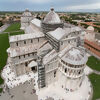
Pisa
Pisa is a city in central Italy's Tuscany region best known for its iconic Leaning Tower (the bell tower of the city's cathedral). Although Pisa is known worldwide for its leaning tower, the city contains more than 20 other historic churches, several medieval palaces and various bridges across the River Arno. Much of the city's architecture was financed from its history as one of the Italian maritime republics. The city is also home of the University of Pisa, which has a history going back to the 12th century and also has the mythic Napoleonic Scuola Normale Superiore di Pisa and Sant'Anna School of Advanced Studies as the best sanctioned Superior Graduate Schools in Italy.
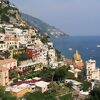
Positano
Positano is a village and comune on the Amalfi Coast (Costiera Amalfitana), in Campania, Italy. The main part of the city sits in an enclave in the hills leading down to the coast. The church of Santa Maria Assunta features a dome made of majolica tiles as well as a 13th century Byzantine icon of a black Madonna. According to local legend, the icon had been stolen from Byzantium and was being transported by pirates across the Mediterranean. A terrible storm had blown up in the waters opposite Positano and the frightened sailors heard a voice on board saying "Posa, posa!" ("Put down! Put down!"). The precious icon was unloaded and carried to the fishing village and the storm abated.

Marseille
Marseille, known in antiquity as Massalia, is the second largest city in France, after Paris, with a population of 852,395 within its administrative limits on a land area of 240.62 km2. The urban area of Marseille extends beyond the city limits with a population of over 1,420,000 on an area of 1,204 km2. 1,530,000 or 1,601,095 people live in the Marseille metropolitan area. Located on the southeast coast of France on the Mediterranean Sea, Marseille is France's largest commercial port and largest French city on the Mediterranean coast. Marseille is the capital of the Provence-Alpes-Côte d'Azur region, as well as the capital of the Bouches-du-Rhône department. Its inhabitants are called Marseillais.
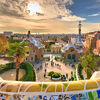
Barcelona
Barcelona – Spain's enchanting capital, second largest and most populous city. It is a huge city that vibrates with life, and there’s certainly not another city in the country to touch it for its sheer style, looks or energy. It is one of the world's leading tourist, economic, trade fair and cultural centers, and its influence in commerce, education, entertainment, media, fashion, science, and the arts all contribute to its status as one of the world's major global cities. Barcelona is home to masterpieces of many great architects – the most famous of which is Antoni Gaudí.
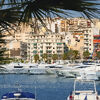
Piraeus
Piraeus is a city in the periphery of Attica, Greece and within the Athens urban area, located 12 km southwest of its center and upon the Saronic Gulf. According to the 2001 census, Piraeus has a population of 175,697 people within its administrative limits, making it the third largest municipality in Greece and the second within the Greek capital following the municipality of Athens. The Piraeus urban area extends beyond the administrative city limits to the suburban municipalities, with a total population of 466,065.

Santorini Airport

Portofino

Sorrento
Sorrento Neapolitan: Surriento is a town overlooking the Bay of Naples in Southern Italy. A popular tourist destination, it can be reached easily from Naples and Pompeii as it is at the south-eastern end of the Circumvesuviana rail line. The Sorrentine Peninsula has views of Naples, Vesuvius and the Isle of Capri. The Amalfi Drive, connecting Sorrento and Amalfi, is a narrow road that threads along the high cliffs above the Tyrrhenian Sea.
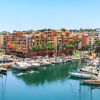
Monte Carlo
Monte Carlo, officially refers to an administrative area of the Principality of Monaco, specifically the ward of Monte Carlo/Spélugues, where the Monte Carlo Casino is located. Monaco has four traditional quarters - from west to east they are: Fontvieille (the newest), Monaco-Ville (the oldest), La Condamine, and Monte Carlo. Monte Carlo (literally "Mount Charles") is situated on a prominent escarpment at the base of the Maritime Alps along the French Riviera. Near the western end of the quarter is the world-famous Place du Casino, the gambling center which has made Monte Carlo "an international byword for the extravagant display and reckless dispersal of wealth". It is also the location of the Hôtel de Paris, the Café de Paris, and the Salle Garnier (the casino theatre which is the home of the Opéra de Monte-Carlo).

Taormina

Civitavecchia
Civitavecchia is a town and comune of the Metropolitan City of Rome in the central Italian region of Lazio. A sea port on the Tyrrhenian Sea, the name ''Civitavecchia'' means "ancient town". The modern city was built over a pre-existing Etruscan settlement. The massive Forte Michelangelo was first commissioned from Donato Bramante by Pope Julius II, to defend the port of Rome. The upper part of the "maschio" tower, however, was designed by Michelangelo, whose name is generally applied to the fortress. North of the city at Ficoncella are the Terme Taurine baths frequented by Romans and still popular with the Civitavecchiesi. The modern name stems from the common fig plants among the various pools. And also next to the town is the location of the cruise ship docks. All major cruise lines start and end their cruises at this location, and others stop for shore excursion days that allow guests to see Rome and Vatican sights, which are ninety minutes away.










